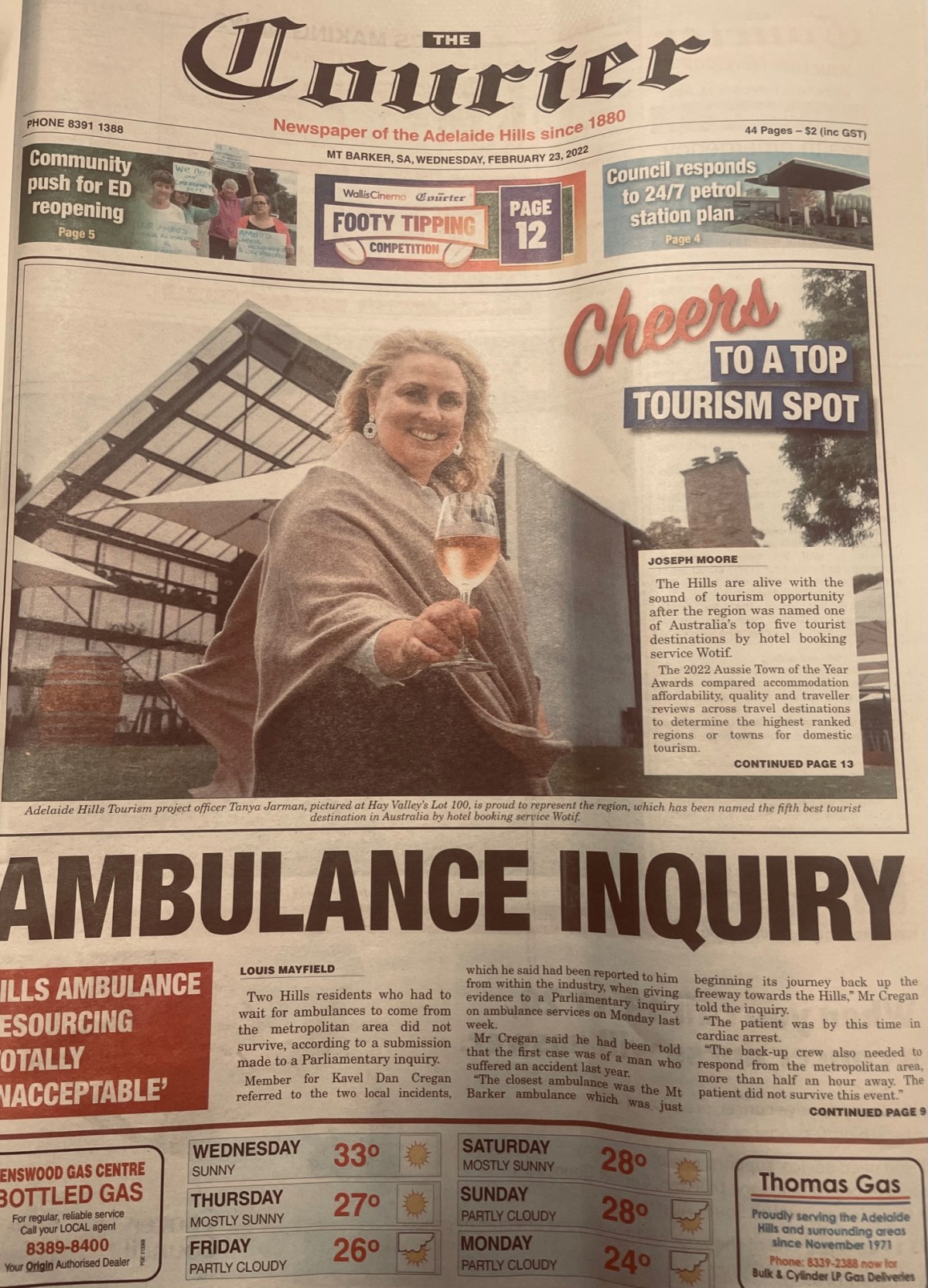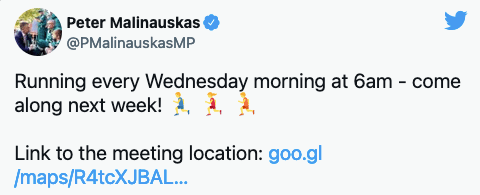Electoral advertising or personal protest? Ambos read the riot act
CAMPAIGN DIARY | As the state election campaign begins in earnest, the new boss of the ambulance service has made an extraordinary plea to paramedics, claiming messages ‘chalked’ on ambulances are electoral advertising. But how will this play in key seats? This and more in the first Campaign Diary of the season.


Ramped ambulances with chalked messages, that the ambulance service boss argues are now "electoral advertising". Photo: Tony Lewis/InDaily
Cease and desist
Late yesterday, the relatively new chief executive of the SA Ambulance Service Rob Elliott issued a passionate note to staff demanding an end to paramedics’ on-the-job campaign for more services.
Elliott’s emailed note to staff was a full-on crack at paramedics wearing campaign T-shirts at work and claimed that the practice of ‘chalking’ – campaign messages written on ambulances, which has been happening for months now – was effectively electoral advertising. He went further, claiming the campaign breaches caretaker conventions, which prohibit public sector employees from using public resources to advantage a political party.
“As we approached the election the Electoral Commissioner determined in some cases chalking had become electoral advertising, which is why it had to comply with the Electoral Act,” Elliott wrote. “But we are public sector employees, and we must not be using our public sector employment or public sector property to conduct electoral advertising.”
And there was more. He suggested the employees’ campaign was also in potential breach of the Public Sector Act – “another clause that does not allow you to speak out”.
The clause in question is curious, because it explicitly allows public sector employees “to engage in a private capacity in conduct intended to influence public opinion on an issue, or promote an outcome in relation to an issue of public interest” except in certain circumstances.
Those exceptions, broadly, include if the conduct may “seriously prejudice the Government or a public sector agency”, or if the conduct discloses certain information (in breach of intellectual property rights, is contrary to the law, or seeks to secure a pecuniary “or other advantage” for the employee), or is “disgraceful or improper”.
“I am asking that chalking stop because it’s public property, and some messaging fundamentally conflicts with impartiality of the public sector,” Elliott argues. “I think it conflicts with the code of ethics, conflicts with the caretaker conventions Guide and sits outside s15(2) which specifies ‘private capacity’.”
He says the union can engage in whatever electoral advertising it wants – but individual employees on the job cannot.
It seems an unusual delineation in the context of historic union practice, but his argument there is that a mediation agreement stated that the Ambulance Employees’ Association would cease “all industrial action”.
Individuals, though, might need a lawyer to interpret the caveat on his claim that he respects individuals’ rights to speak out on important issues.
“I ask that you stay within s15(2) when you do, you do it in a private capacity without using public property, don’t act contrary to (a), (b) or (c) above and for the next 6 weeks respect the caretaker conventions as public sector employees. To achieve that, chalking needs to stop immediately and abide by the direction (attached) given 31 May 2021.”
The union had a blunt response.
Today the Marshall Govt attempted to silence ambos yet again with the SAAS CEO directing ambos to stop chalking and hiring more taxpayer funded commercial cleaners to wipe off messages.
Ambos chalk because they care deeply for their community. #IStandWithOurAmbos #saparli pic.twitter.com/WQrkK47nL3
— Ambulance Employees Association (SA) (@aeasa1981) February 22, 2022
Premier Steven Marshall today agreed with the ambulance boss, saying the chalked slogans were inappropriate.
“We are the best-funded ambulance service on mainland Australia,” he said. “Obviously … the unions are running a political campaign. They’re backing their horse.
“We’ve got to govern this state not just for the unions but for all South Australians.”
Labor leader Peter Malinauskas, unsurprisingly, sees this as a freedom of speech issue, saying it would be a “sad day in the history of South Australia” if the government was seeking to “suppress the democratic voice of those people who service our community”.
“It’s a free country and in elections, people are allowed to express their opinions. I think frontline workers deserve the opportunity to express their voice.”
On the ground
The first week of the campaign has been a quiet affair compared to the colour and movement of 2018, when Nick Xenophon’s unique campaigning approach was in overdrive.
 But, as with 2018, the story of this election will be told in ultra-local campaigning, which is why the Liberals must be worried about what’s happening up the South Eastern Freeway in the once safe Liberal seat of Kavel.
But, as with 2018, the story of this election will be told in ultra-local campaigning, which is why the Liberals must be worried about what’s happening up the South Eastern Freeway in the once safe Liberal seat of Kavel.
Former Liberal, now independent Dan Cregan, has arguably been in campaign mode for months. And the above ambulance issue is one campaign point that has a lot of traction on the ground.
Every day, the Hills’ ambulances remind locals of the scarcity of services, via the aforementioned ‘chalking’.
And today’s edition of The Courier, the 142-year-old Hills newspaper that still carries considerable influence, includes Cregan’s front page allegations that two locals have died due to long waits for an ambulance to arrive.
In fact, Cregan pegs his concerns about Mt Barker’s “single ambulance” to his decision to quit the Liberal Party in October last year.
He says he raised the issue with Health Minister Stephen Wade in May last year without a positive response.
“These are real events and circumstances that are occurring in my community and that have been left unaddressed,” he told The Courier. “I needed to become an independent member.”
Hide and seek
The issue has obvious electoral potency, but it has also impacted the early conduct of the campaign.
When he visited Government House last weekend to kick off the formal campaign, Premier Steven Marshall took the back entrance to avoid ambulance union members protesting on North Terrace.
Marshall’s appearances since then have been on friendly territory – Bickford’s with federal Treasurer Josh Frydenberg and The Star of Greece at Port Willunga today, an establishment owned by Business SA chair Nikki Govan.
As has become common practice in Australian elections, journalists only get broad clues about the time and location of events. That information is conveyed as late as possible to limit the chance of noisy protesters ruining the pictures for the evening news.
Labor leader Peter Malinauskas, on the other hand, is in friendly territory with the health unions, with his first week of campaigning focusing almost entirely on promises to “fix” the health system that he oversaw as minister in the latter days of the Weatherill Government.
His commitment to populist health announcements has been consistent, beginning with his promise to hire “100 new doctors” for the public system. It’s a suspiciously nice round figure. Is he sure we don’t need 110? Or perhaps 99?
Running man
Along with attempting to blast the news agenda with his policy announcements, the Labor leader’s other key focus has been on building his profile through a glossy, USofA-style presidential campaign.
Part of this, oddly, has been pushing his physical pursuits.
The youngish leader’s topless appearance in a swimming pool a few weeks ago continues to attract attention, which is rather embarrassing for everyone involved (including the media).
Now, he’s inviting voters to go for a jog with him once a week during the campaign.

It’s a far cry from John Howard in his Aussie tracksuit or even, Nick Xenophon wandering parliament house in his pyjamas.
But the desired effect, no doubt, is the same.
Premier Steven Marshall seems to think his opponent’s health regime is a political negative, today reiterating that his focus is on the economy: “No jogs around the park, no dips in the pool.”
Campaign Diary will be a regular feature in the lead-up to the election, taking you to all corners of the campaign.





